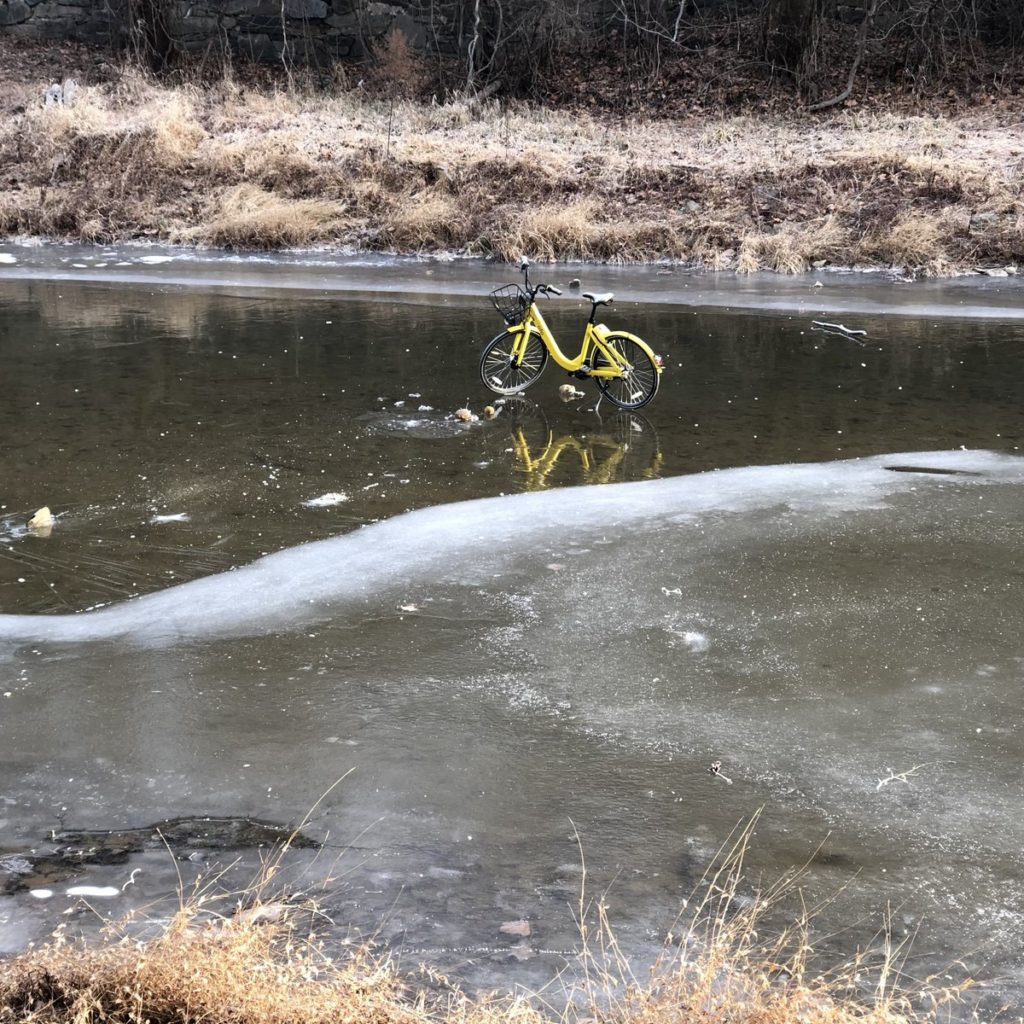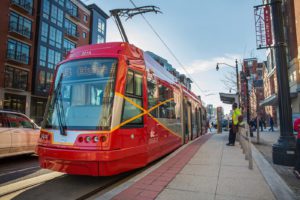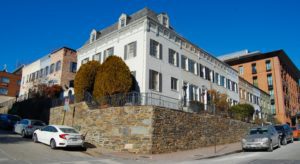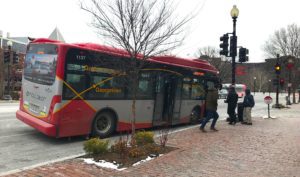Town Topics Jan. 10, 2017
By • January 10, 2018 0 569

For Some, Dockless Bikes on Thin Ice
The new dockless bike-share program, which seeks to bring more choice to citywide transportation, has been getting attention from Georgetown residents. The bikes can be parked on city property in a random fashion and would-be renters can check an app to see where the nearest ones are located. Seems simple enough.
But, for some, the randomness of where the bikes are parked is irksome. There have been community meetings on the bike program already.
Last week, one allegedly cranky Georgetown resident wrote on the Georgetown Forum, a community bulletin board maintained by the Citizens Association of Georgetown, that residents ought to call 911 about parked bikes that block the sidewalk — and even call 911 when they see the bicycles ridden along the streets.
The comment got blasted in social media to the detriment of Georgetown’s reputation, as if Georgetowners wanted such random bicyclists out of the neighborhood all together (not a good reflection on the oldest neighborhood in Washington, D.C.). Other commenters suggested that those obstructed by abandoned bikes call 311, a non-emergency number.
Such sniping aside, the Metropolitan Police Department felt the need to weigh in on this latest bike brouhaha with regard to calling 911: “It is difficult to accurately capture the total number of complaints. Much of the feedback and frustrations associated with the placement of dockless bikes we have received has been during community meetings, email exchanges and public interactions.
“At the last bikeshare meeting we hosted, we discussed the issues experienced thus far in D.C. We will continue to stay engaged with these companies and our communities to identify a solution that works for everyone.
“While we recognize some recent frustrations, the MPD urges residents to refrain from dialing 911 to report suspicious activity for merely utilizing bikeshare services. The law regarding false alarms and false reports is § 22–1319 False alarms and false reports; hoax weapons. We still encourage our residents and visitors to report any activity that they deem suspicious.”
Community activist David Abrams added to the discussion: “While it may not be appropriate to call 911 to sic the police on dockless bike riders, it is entirely appropriate to call 311, if you see any dockless bicycle parked illegally or inappropriately. Illegal and/or inappropriate parking of dockless bikes means any dockless bike that is parked on, or leaning against, private property, leaning against a tree or blocking access to a doorway or a Metro stop.”
Sam Zimbabwe of the D.C. Department of Transportation, which is overseeing the bike program, was cited by Abrams: “Bikes have to be parked to leave a pedestrian-clear zone of at least five feet.”
Abrams continued: “If the bikes impede a clearance zone of five feet they are a public hazard and need to be reported to 311 to have them removed. DDOT would rather we call the individual private dockless bike companies to have individual bikes removed by the companies themselves. That is both an undue burden on tax- paying citizens and a clear example of this ill-conceived and not-thought-through dockless bike program. It’s a shame that we have to waste city money on calling 311 but DDOT has left us with no reasonable alternative. When 311 is called, they will also e-mail you a copy of your service request so be sure to ask for that documentation.”
The bike saga will continue (the trial period concludes in April), no doubt — and move in new directions and places.
Take, for example, last week’s comment by Kevin Donohue, deputy mayor for public safety and justice: “Please don’t park your dockless bikes in the middle of the C&O Canal.” An Ofo bike was shown on Twitter parked on the surface of the frozen canal, just west of Georgetown.
To boot, technically, dockless bike-share operations are not authorized to operate on National Park Service land. As the C&O Canal is part of the National Park Service, its spokeswoman Jenny Anzelmo-Sarles told WTOP, “While dockless bike share services do not currently have authorization to operate on National Park Service land in the D.C. area, we are actively engaged in dialogue with DDOT and bike share operators to address the issue.”
 War on Waste Widens: Yes to Clean Pizza Boxes
War on Waste Widens: Yes to Clean Pizza Boxes
Under the motto of “Zero Waste,” the District Department of Public Works has issued new regulations, effective Jan. 1, expanding the number of items for residents to recycle. The list is now the same for residential and commercial users. But there is some confusion.
For instance, under the plastic category, no plastic bags, straws or utensils nor items made from foam polystyrene (often mistaken for Styrofoam, which is banned in the District) can be recycled. Bulky plastic items such as old buckets can be recycled as long as they are clean.
Pizza boxes are now recyclable, along with other paper goods such as magazines, newspapers, books, phone books, junk mail and office paper. However, to be recycled, pizza boxes — like paper and plastic plates, cups, bottles and other food containers — must be clean and empty of any trace of organic material.
The same goes for metal and glass items, including steel and aluminum bottles, cans and containers. Paint cans are still not accepted. As for glass recyclables, no windows or ceramics are accepted.
Almost all food-service containers can now be recycled. However, they have to be larger than two inches by two inches and must be clean and empty (no organic waste).
Recyclables do not have to be bagged; they can be left loose in the recycling container.
DPW proclaims that it has a citywide goal of getting 80 percent of waste out of landfills. For details, visit zerowaste.dc.gov.
 DC Streetcar Is Jan. 23 Topic
DC Streetcar Is Jan. 23 Topic
An environmental assessment of the proposed Union Station-to-Georgetown streetcar will be reviewed at a public meeting on Jan. 23 at 6 p.m. in Room 108 of George Washington University’s Funger Hall, 2201 G St. NW.
It will be the fourth planning meeting held over the past several years about the Georgetown streetcar link. This one will focus on potential storage and maintenance sites for new streetcar vehicles, which cannot be accommodated in existing facilities. It will also provide an update on the technical analysis being prepared by the Department of Transportation in accordance with national environmental policy and historic preservation regulations.
But funds for construction and maintenance of any Union Station-to-Georgetown streetcar link were not included in the District’s $13.8-billion 2018 budget, approved by the Council last June. The Council approved $6.6 million for the Benning Road Extension, giving that project full funding of $199 million, but $35 million for streetcar replacement was eliminated.
Council Chair Phil Mendelson had proposed cutting all streetcar funds a few weeks earlier, calling the project “horribly botched,” “wildly unpopular” and “a novelty that was likely to remain so.” Later, however, he conceded that extending the H/Benning segment made sense.
The Benning Road Extension is expected to begin construction in 2021, with completion in 2023. The current 2.4-mile H/Benning segment opened in February of 2016.

At 31st & South Streets, where townhouse suites sit above the street, next to the Rosewood Hotel. Georgetowner photo.
Rosewood Hotel to Annex Townhouses
A design proposal by the Rosewood Hotel — next to the C&O Canal at 1050 31st St. NW — to convert six neighboring one-bedroom townhouses into luxury hotel suites was approved Jan. 3 by the Georgetown-Burleith Advisory Neighborhood Commission.
The townhouse hotel suites would “fill a niche market,” according to Rosewood Managing Director Pascal Forotti. “They would provide the services of a hotel but with more independence.”
Each townhouse would offer a ground-floor living room, a kitchen area, a single bedroom and a bathroom, plus an outdoor garden patio with a bistrot table and chairs. Each is about 1,000 square feet and could be rented by the day, the week, the month or even the year. Rates have not yet been determined, but a night’s lodging in one of the hotel’s suites runs between $1,000 and $3,000.
The idea was met with mixed feelings by the neighborhood last month. On the one hand, the hotel has been a classy addition to the neighborhood, according to Citizens Association of Georgetown spokesperson Elsa Santoyo. On the other hand, extending the hotel by buying and painting six adjoining townhouses all the same color and with the same décor (identical awnings, etc.) would take away from Georgetown’s character of individuality. “We want to be sure the individualization does not disappear,” Santoyo said.
“Generally, we welcome it, but want to have a conversation about the details,” said Advisory Neighborhood Commissioner Lisa Palmer, in whose district the project lies. “We want to make sure they respect the history of the area, where multiple individual townhouses were built from the 1800s.”
At press time, the hotel had agreed not to install awnings and to allow each townhouse to retain different exterior paint colors. The ANC concurred with architect Michael Winstanley’s plans to renovate the townhouses and repair windows, fix the walkways and the like for the owner, 31st Street Townhouses LLC. The specific properties are located at 1026, 1032, 1040 and 1042 31st St. NW and 3103 and 3105 South St. NW.
Burleith Pop-Up Gets Thumbs Down
A request for a special zoning exception to build what is known as a pop-up house addition in Burleith at 3608 S St. NW engendered a lively discussion, passionate opposition by several neighbors in attendance, additional opposition in writing and finally a vote of unanimous disapproval by the Georgetown-Burleith Advisory Neighborhood Commission at its Jan. 3 meeting.
The planned house reconstruction would not only have almost tripled the size of the current home, from 1,038 square feet to 2,850, it would also have “popped up” the house vertically, adding a full-floor third story with a balcony and a roof deck (roof decks are generally allowed in Burleith, but not in Georgetown).
Some 15 neighbors objected, saying that the addition was too big and of a massing inappropriate to the neighborhood and that it would reduce privacy and block sunlight from neighboring yards. That the immediate neighbor did not object was given little weight, since that home’s owner is an absentee landlord.
 Circulator Comments Due Feb. 5
Circulator Comments Due Feb. 5
Major service and fare adjustments are being proposed for the DC Circulator buses, with the public invited to submit comments through Monday, Feb. 5.
Among the proposed changes is elimination of unlimited-use paper passes, which are valid only on the DC Circulator. The Circulator will continue to accept the unlimited Regional Bus Pass available on SmarTrip cards. No change is proposed to the base fare of $1 per trip.
DDOT is also formally proposing that the Georgetown-Union Station route include regular late-night service between McPherson Square and Union Station from 9 p.m. to 3 a.m. on Friday and Saturday evenings.
“The service changes are intended to better align our resources with growing activity centers and improve the reliability of the service,” said DDOT Acting Director Jeff Marootian.
Details about the proposed service and fare adjustments, as well as the final Transit Development Plan document, can be viewed or downloaded at dccirculator.com/tdp2017.

